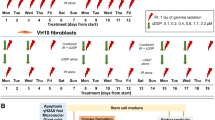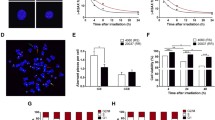Abstract
The role of the initial DNA double-strand breaks (dsb) as a determinant of cellular radiosensitivity was studied in human breast and bladder cancer cell lines. Cell survival was measured by monolayer colony-forming assay as appropriate and differences in radiosensitivity were seen (alpha-values ranged from 0.12 to 0.54). After pulsed-field gel electrophoresis (PFGE) the initial slopes of dose-response curves were biphasic with a flattening of the curves above 30 Gy. When the frequency of DNA dsb induction was assessed using a mathematical model based on the DNA fragment size distribution into the gel lane, we found a statistically significant relationship between the number of DNA dsb induced and the corresponding alpha-values and fraction surviving after 2Gy (P = 0.0049 and P = 0.0031 respectively). These results support the view that initial damage is a major determinant of cell radiosensitivity.
Similar content being viewed by others
Author information
Authors and Affiliations
Rights and permissions
About this article
Cite this article
Ruiz de Almodóvar, J., Núñez, M., McMillan, T. et al. Initial radiation-induced DNA damage in human tumour cell lines: a correlation with intrinsic cellular radiosensitivity. Br J Cancer 69, 457–462 (1994). https://doi.org/10.1038/bjc.1994.83
Issue Date:
DOI: https://doi.org/10.1038/bjc.1994.83
- Springer Nature Limited
This article is cited by
-
Cellular radiosensitivity: do separate predictive parameters apply for fibroblasts and for human tumour cells?
British Journal of Cancer (2004)
-
Radiosensitivity of human tumour cells is correlated with the induction but not with the repair of DNA double-strand breaks
British Journal of Cancer (2003)
-
PARP-1 modifies the effectiveness of p53-mediated DNA damage response
Oncogene (2002)




